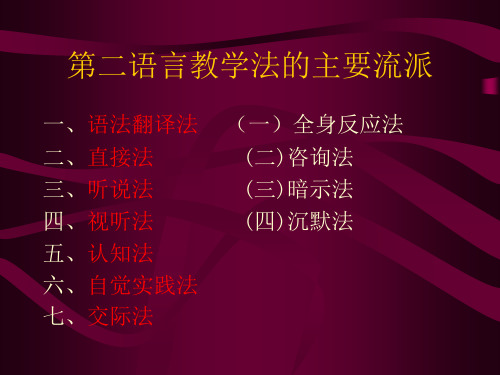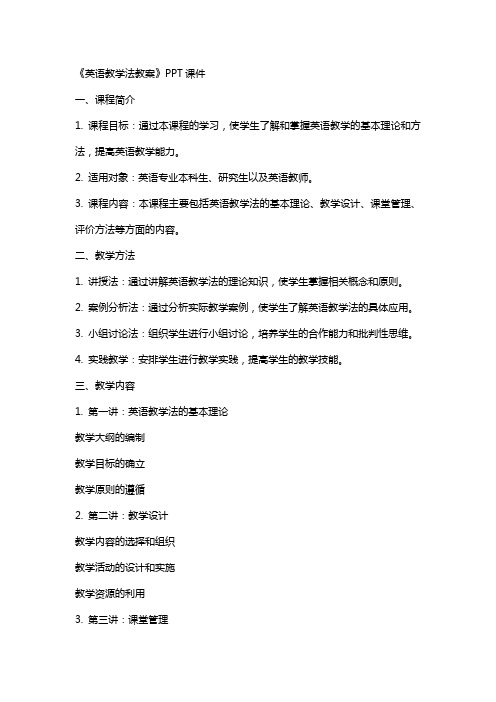英语教学法3.课件整理
中小学英语教师培训 教学课件【优质PPT】

2021/5/27
21
三、外语教学法简介
❖5. Total Physical Response (20C60年代初美国,
盛行于20C70年代)—by James T. Asher
❖ 特点:通过全身动作教授外语的方法
❖
适合低年级或语言学习的初级阶段
❖ 不足:难以表达虚词含义
❖ 核心:以学生为中心,强调学生对知识的主动探 索,主动发现和对所学知识意义的主动建构;
❖ 建构主义教学方法:支架式教学(Scaffolding instruction)
2021/5/27
13
(三)语言学对语言学习的影响
❖区分:Acquisition: Mother language / L1,L2
2021/5/27
23
三、外语教学法简介
❖ 7. Task-based Language Teaching Approach (20C80年 代兴起)
❖ 指教师通过引导语言学习者在课堂上完成任务来进行的教 学。
❖ 强调“在做中学” (Learning by doing),交际教学法的发 展
❖ 操作过程:任务前、任务中、任务后
2. 四种二语习得理论
❖ (1) 中介语理论(Interlanguage) by Selinker
❖
ML
TL
❖
Chinglish
❖ mother language
target language
❖
❖ 中介语是介于母语与目标语之间的一种语言
❖ 母语的干扰:Transfer(迁移)
❖ 包括: Positive transfer(正迁移)(母语帮助目标语)
6
The_National_English_Curriculum英语教学法_国家英语课程标准 3

Challenges facing English language teachers
• Views: a system of li来自guistic knowledge
a means for communication
• Role: a knowledge transmitter
multi-role educator
批注本地保存成功开通会员云端永久保存去开通
Performance standards for different levels of competence
Descriptions of Level Standards
• Level 2: Have interests and hobbies for English learning. Can use simple English greeting with others, exchanging about personal, family and friends ‘s simple information. Can learn the dialogue or simple song according to the content you have learned. Can understand, read and tell the simple story under the help of the pictures. Can write simple sentences according to the pictures and tips. Be willing to participate in, cooperate and be initiative to ask for advice in the study. Be happy to know foreign cultures, customs.
英语教学法课件 Unit 3 新标准解读 王蔷

目标总体描述( 目标总体描述(2 级)
对英语学习有持续的兴趣和爱好. 对英语学习有持续的兴趣和爱好.能用简单的英 语互致问候,交换有关个人,家庭和朋友的简单信息. 语互致问候,交换有关个人,家庭和朋友的简单信息. 能根据所学内容表演小对话或歌谣.能在图片的帮助 能根据所学内容表演小对话或歌谣. 下听懂,读懂并讲述简单的故事. 下听懂,读懂并讲述简单的故事.能根据图片或提示 写简单的句子.在学习中乐于参与,积极合作, 写简单的句子.在学习中乐于参与,积极合作,主动 请教.乐于了解异国的文化和习俗. 请教.乐于了解异国的文化和习俗.
课程结构体现高中课程改革的思路
1,基础性:模块中的必修课程(英语1~5)主要是使学生 ,基础性:模块中的必修课程(英语1~5) 1~5
达到七级目标要求, 达到七级目标要求,从而具备高中生必备的英语基础素 养. 时代性: 2,时代性:英语课程的时代性将主要体现在课程的设置考 虑学生终身学习需要, 虑学生终身学习需要,关注学生的情感和策略以及跨文 化意识与能力的形成. 特别是课程采用模块方式设置, 化意识与能力的形成. 特别是课程采用模块方式设置, 具有较高的灵活性和开放性, 具有较高的灵活性和开放性,从而使学校和教师可以不 断更新教学内容,使之具有时代性. 断更新教学内容,使之具有时代性. 选择性: 3,选择性:选修课程为学生学习英语提供了多种可选择学 习内容. 习内容. 体现对学生能力的培养: 用英语进行交流的能力, 4,体现对学生能力的培养: 用英语进行交流的能力,获 取信息和处理信息的能力,用英语思维和表达的能力. 取信息和处理信息的能力,用英语思维和表达的能力.
基础教育阶段英语课程的基本理念
1 面向全体学生,注重素质教育 面向全体学生, 2 突出学生主体,尊重个体差异 突出学生主体, 3 整体设计目标,体现灵活开放 整体设计目标, 4 强调学习过程,倡导体验参与 强调学习过程, 5 注重过程评价,强调能力发展 注重过程评价, 6 开发课程资源,拓展学用渠道 开发课程资源,
仁爱英语8上U3T3SC说课课件

2.播放1a录音,让学生听录音回答问题 Did people pray on the “holy day”?
Why did people call Monday mornings
“blue Mondays”?
When did the two-day weekend begin?
3.再次放1a录音,让学生跟读
When do they usually do these things? On the weekends.
Do you like weekends?
Do you know the history of the weekends?
Step 2 Presentation(呈现)
1. 通过对周末历史的简短概述来引入新 单词和短语的学习 a “holy day” pray factory closed stop doing sth. too… to… solve the two-day weekend
3. 复述课文 根据黑板上的关键字提示,先
分组复述, 每个大组负责段落的 复述, 之后,每个大组找一个代 表来复述整篇文章。
Step 4 Practice(练习)
1. 教师总结学生们的复述,同时运
at Kangkang did last Sunday?
4. Homework:
用过去进行时写一篇关于自己上 周末是怎样度过的文章。
Part five– Blackboard design 板书设计
What were you doing at this time yesterday?
Key New Difficult words words sentences and phrases
2. 学生分析:
英语教学方法ppt课件

何东方
1
Review The Grammar-Translation Method
Definition: It means to translate from mother tongue to target language.That is to say,the method teaches foreign language with grammar explaination and translation exercise.
电子技术为核心的知识、技术技术密集型产业发展很快。 ➢ 听说法是20世纪40年代末在美国形成的外语教学法。二战期间,美国军
队进驻很多国家,军人急需掌握外语,特别是通过军队外语培训等教学 活动,创立了听说法。 ➢ 20世纪60年代末70年代初,随着另一门新兴学科社会语言学的诞生,社 会语言学家提出了“交际能力”的概念,在外语教学界引起了强烈的反 响,交际教学法学派随即迅速崛起。 ➢ 在交际法的带动下,20世纪70年代还兴起了人文主义教学法,主要包括 沉默法(the silent way)、提示法(suggestopedia)、社区式语言学习 (community language learning)和全身反应教学法(the total physical response method)等新型的外语教学法。这些教学法的共同特点是强调 学生是教学的主体。除了分析学生的需要和学习过程外,还注意学生学 习外语的心理特点,努力创造条件,排除学生学习外语时的心理障碍。 4
2
外语教学简史
一、500年前,
➢ 15世纪以前,在西欧、拉丁语处于主流地位,不仅用于日常口语
小学英语词汇教学-PPT课件

.
23
五、故事呈现法
“故事是儿童的第一需要。” 故事呈现法就是利用小学生对故事有
特殊兴趣的这一心理特征,在新单词 呈现之前教师用学生能听懂的语言, 借助图片、动作、手势等辅助手段讲 述故事来激发学生的兴趣,为学习新 单词做好铺垫。
.
24
cake、hamburger、popcorn、 hot dog、bread、French fries
把这些单词穿插在故事中,并用 多媒体课件展示出来:在装饰着小彩灯、 各色汽球的肯德鸡快餐店里,动物们将为 Monkey举行一个Birthday Party。随着故 事情节的发展,课件上逐渐呈现动物们喜 爱吃的食物,教师逐一教授单词。
.
25
六、角色呈现法
英语教师都知道,学生最容易弄混 人称代词的用法。教师可设计:指 名一个男孩和一个女孩到前面站定, 然后点着自己说“I”,指着男孩说 “he”,指着女孩说“she”,点着黑 板上画的鸟说“it”,学生就能从不 同的角色分配中理解词义,掌握单 词。
一边说open,一边打开教室 门;一边读close, 一边关教 室门。学生们很快就会领悟 open,close的意思了。
.
16
jump、run、walk、fly
直接做动作,或边跳边说:“I can jump!Jump,jump,jump!”或边走边说: “I can walk!Walk, walk, walk!”学生 们兴趣很高,一边模仿老师的动作,一边 有节奏地跟读,很快就记住了单词。可以 说,在小学英语教学中,体态语起着举足 轻重的作用,学生们很容易把动作和单词 联系起来,便于理解记忆。
词开始的。
.
2
二、词汇教学的内容
教常用词汇,并不断丰富词汇 教理解词义,掌握词的发音 教在听说读写各技能中正确运用词汇
外语教学法主要流派介绍ppt课件

1、功能法产生的时代背景 威尔金斯《意念大纲》
( “Notional Syllabuses”,1978 )
2、功能法的理论基础 1)语言学理论基础 2)心理学理论基础
3、功能法的基本原则 1)以单元---学分体系组织语言教学 2)以功能意念为纲 考虑交际要素 3)教学过程交际化 4)基本目的语和专业目的语兼顾
日常交际 完整的交际活动 1、理论基础
1)语言习得理论 2)社会建构理念 3)课程理论
2、教学原则与特点 原则: 1)言语、情景真实性 2)形式---功能性 3)任务相依性 4)做中学 5)脚手架
特点: 1)目标 2)教师的输入 3)教学技巧与方式 4)教师角色 5)学生角色 6)评价方式与内容
第二语言教学法的主要流派
一、语法翻译法 二、直接法 三、听说法 四、视听法 五、认知法 六、自觉实践法 七、交际法
(一)全身反应法 (二)咨询法 (三)暗示法 (四)沉默法
一、语法翻译法
• 语法翻译法是以语法为基础用母语来教授外 语的一种方法
1、语法翻译法的理论基础 2、语法翻译法的教学原则
1)以语法教学为中心 强调系统语法的学习 2)语言材料的内容以突出某种语法形式为准 3)运用学生母语进行课堂教学 4)以阅读和书面翻译为主 3、对语法翻译法的评价
4、对自觉对比法的评价 附:自觉实践法
七、认知法(cognitive Approach)
• 按照认知规律 • 调动学生的智力潜能 • 努力发现和掌握语言规则 • 创造性地活用语言 • 一种外语教学法体系 • 又称为认知——符号学习理论
1、认知法产生的背景 2、认知法的理论基础 3roach) 1、视听法产生的时代背景 2、视听法的理论基础
1)语言学理论基础
高中英语学习方法的建议 PPT课件 图文

二、高中英语与初中英语课程 的不同点。
• 1.听力理解由浅层的信息获取转向 深层的信息加工处理
高中英语听力除了题型变化,听力材 料内容难度增加,语速变快外,更强调 学生对所获取信息的深层理解(包括猜 测,推理,归纳等)同时也强调对学生 书面表达能力的考查。
2.词汇由常用生活词汇(基本词汇) 扩展到大量核心词汇及认知词汇
Ten minutes every day is better than ten hours in one day!
2.要尊重记忆规律,反复是 关键。
记住:
Always keep an English book at hand! 利用点滴时间:与其他学科穿插进行。早晨
是学习英语的大好时光。
一、如何科学记忆单词:
一、高中英语学习的指导思想
• 学习中要注意的几点:
1.要点滴积累,不要急于求成。 记住:Rome wasn’t built in a day! 罗马不是一天建 成的。/ 复杂的工作不会一蹴而就.
急于求成就可能会造成消化不良,或者一事无成的结果。 急于求成往往表现为对自己提出过高的要求。这样做往往会 给自己很大压力,进而对自己逐渐失去信心,失去兴趣。记 住:
• 1)学习内容方面:20%的知识——自学能 会,
•
70%的知识
——合作学会,
•
10%的知识—
—老师教会。
• 高效课堂的五个基本步骤
• 预习自学,自主探究;
• 完成学案,训练应用;
• 分组合作Biblioteka 讨论解疑;• 展示点评,总结升华;
• 高效课堂对学生的要求
• 1——预习:完成导学案。前提是1) 在熟
记单词,自己能读,能默写。2) 导学部分 内容学生自己至少看3遍以上,单词,词组 和句子要能在课本中用红线划出来。
小学英语教学方法PPT教学课件

果能把内容相近、相反或相同的可比性
知识放在一起进行对照、比较,就能帮
助学生把类别性的知识“连接”起来,
使他们在头脑中有一个链条式的记忆锁,
提高小学生进行初步抽象概括思维的能
力。例如在教学Panda这个单词时,可
以就它与学过的器官eye的一个共同属
性———黑白颜色进行归纳总结。这样
教学将关键词Panda、Eye、Black、
过渡。又如在导入Stationeries时,可以
先用汉语告诉学生一个chant“铅笔盒里有
铅笔,铅笔里面有钢笔”,利用学生此
时产生的“?”疑惑感,如此在接下来
的教学中通过展示、教学这三个单词,
使学生恍然大悟,产生一种解疑后的喜
悦感和成就感。
2020/12/10
11
对比导入
对比导入,即是在教师讲授新课时,如
曲导入动物话题的教学;然后再把歌词
相应地替换成“Teddy Dog,Teddy
Rabbit…”达到在一个轻音乐缭绕的氛围
中导入一项教学内容的目的。
2020/12/10
10
悬念导入
恰当的悬念是一种兴奋剂。教师在教学
中给学生设下悬念,能勾起学生强烈的
破疑愿望,激起他们寻根探源的欲望,
从而促使学生迈过“信息沟”实现交际
2020/12/10
8
故事导入
就像每个单元的C部分设置了Story time,以巩
固本单元的内容一样。我们也可以大胆创新,
把它搬家移到一个教学单元的开头。例如对第 四单元的Animals的导入设计。在进行A部分教
学时,教师可以以一个农场主的身份介绍 “Look! I have a rabbit.”……同时还为后面 的song“Old MacDonald”做了铺垫;而在进行 B部分的导入时,教师又可以改扮成一个动物
《英语教学法教案》课件

《英语教学法教案》PPT课件第一章:教学方法概述1.1 教学方法的定义1.2 教学方法的重要性1.3 常见的教学方法介绍第二章:直接教学法2.1 直接教学法的原理2.2 直接教学法的步骤2.3 直接教学法的优缺点第三章:任务型教学法3.1 任务型教学法的理论基础3.2 任务型教学法的实施步骤3.3 任务型教学法的优缺点第四章:全身反应教学法4.1 全身反应教学法的原理4.2 全身反应教学法的实施步骤4.3 全身反应教学法的优缺点第五章:分组合作教学法5.1 分组合作教学法的原理5.2 分组合作教学法的实施步骤5.3 分组合作教学法的优缺点第六章:交际式教学法6.1 交际式教学法的理论基础6.2 交际式教学法的实施步骤6.3 交际式教学法的优缺点第七章:沉默法7.1 沉默法的原理7.2 沉默法的实施步骤7.3 沉默法的优缺点第八章:计算机辅助教学法8.1 计算机辅助教学法的原理8.2 计算机辅助教学法的实施步骤8.3 计算机辅助教学法的优缺点第九章:游戏教学法9.1 游戏教学法的原理9.2 游戏教学法的实施步骤9.3 游戏教学法的优缺点第十章:评估与反馈10.1 教学评估的重要性10.2 常见的教学评估方法10.3 教学反馈的技巧重点和难点解析一、教学方法概述难点解析:理解不同教学方法之间的差异以及如何根据学生的需求和教学目标选择合适的教学方法。
二、直接教学法难点解析:实施直接教学法时,如何有效地使用目标语言进行教学,并引导学生通过实践和应用来掌握语言知识。
三、任务型教学法难点解析:设计具有实际意义的任务,以及如何评估学生在任务中的表现,确保任务的实施能够有效地促进语言学习。
四、全身反应教学法难点解析:如何通过身体动作和表情来促进语言的学习,以及如何平衡语言输入和输出。
五、分组合作教学法难点解析:如何合理分组,以及如何引导小组成员进行有效合作,确保每个学生都能在小组活动中积极参与和学习。
六、交际式教学法难点解析:如何在课堂中模拟真实的交际情境,以及如何评估学生在交际活动中的语言运用能力。
小学英语阅读教学策略和方法ppt课件

教学方式
1、把课文分成四、五部份,每组学生负 责一部份。
2、对于不适合分解的课文,可让学生负 责其中某一方面,如词汇、结构、主题 等。
3、选择四、五篇主题相同的材料,难度 相等或不等,每组负责一篇。
可编辑课件PPT
14
互补式阅读(jigsaw reading)
基本教学步骤 1、分组(2—6人,4、6人为佳,教学过程中,
常有必要再次分组,使学生充分参与交流, 如时间 一同组异质,时间二同组同质。) 2、说明教学目标及任务:交待过程和步骤,说 明拟完成的任务类型,读前词汇练习和讨论, 读后陈述、总结以及向同伴等。
可编辑课件PPT
15
互补式阅读(jigsaw reading)
基本教学步骤
3、分发阅读材料及相关练习,同组的人材料可 不同。
在阅读过程中,请学生标出自己不认识 的生词难句,读后抄在黑板上,然后, 师生共同解决。
在阅读前不讲授,引导学生阅读中,随 机讲解,并引导学生积极参与释义。
可编辑课件PPT
6
阅读过程
阅读前: 利用情景会话引出阅读材料中的关键新词或
新表达法(控制好生词释义的量,培养学生 的猜词悟义能力) 设计问题就阅读文本的话题引导学生联系自 己的生活实际展开讨论 鼓励使用常见阅读策略:skim,scan,predict等
8
阅读过程
阅读中
朗读与默读的作用
默读:真实的阅读行为
朗读:听录音朗读课文能使学生体会语 篇的发音,掌握标准的重音和语调,使 文本有真实的生活感,教师能强调某一 小部分材料时,借助朗读能增强学生的 参与感。
可编辑课件PPT
9
阅读过程
阅读中 2、阅读语篇需要从略(默读)到精多次
英语教学法之直接法ppt课件

Background
• A reaction against the GrammarTranslation Method. • In the mid and late 19th century, European industry developed rapidly.
• The foundation of the IPA and other organizations.
Theoretical Basis
• Direct means takes the place of translation as the main technique in foreign language learning. • Speech patterns should be the fundamental elements of language.
2. Without explicit grammar explanantion, students lack a necessary knowledge of the target language.
3. The Direct Method places a high demand on teachers.
Basic Principles
• Main features:
1. The first language and translation exercises are completely avoided.
2. Grammar is learned inductively through listening and speaking activities (an explicit grammar rule may never be given).
小学英语语法复习PPT课件[1]
![小学英语语法复习PPT课件[1]](https://img.taocdn.com/s3/m/bfba5a0fb7360b4c2e3f6465.png)
一、用所给词的适当形式填空。
1. That is not _____kite. That kite is very small, but ____is very big. ( I ) 2. ___is my brother. ___ name is Jack. Look!Those stamps are___ ( he )
在有效的任务和英语语言环境中,学生才会真正运用语言, 才能达到先听再说、以说促听、以说促写的目的。而且可以克 服“只见树木,不见森林”式的语言学习,在英语语言运用中对 比各语法项目,通过对比再加深认识,从而在交际中使用语言, 理解、掌握语法知识。
(四)归纳整理,系统复习。
小学高年级是语法现象比较集中出现的时候,五年级尤为 突出,出现了许多复杂的句式和一些最基本的语法现象,如: 一般疑问句、特殊疑问句、第三人称单数、like +v-ing、can+ 动词原形。六年级学习一般过去时和一般将来时。这样,大部分 最为基本的语法知识在小学阶段已经学完。这些语法知识有些零 散,需要加以归纳整理,进行系统性的复习,为进入中学学习打 好基础。
小学英语语法
名词复数规则
1.一般情况下,直接加-s,如:book-books, bagbags, cat-cats, bed-beds 2.以s. x. ch. sh及辅音字母加o结尾的,加-es, 如:bus-buses, box-boxes, brush-brushes, watch-watches, tomato-tomatoes, potatoes-potatoes 3.以“辅音字母加 y”结尾的,变y为i, 再加-es, 如:family-families, strawberry-strawberries butterfly-butterflies
英语教学法教程PPT课件

Unit 1 Language & Language Learning
Views on language Views on language learning The qualities of a good language teacher How Can One Become a Good Language Teacher
Most of our day-to-day language use involves functional activities: advising apologizing debating offering
In order to perform functions, learners need to know how to combine the grammatical rules and vocabulary to express notions观念 that perform the functions.
Page 4
Views on language
Structural view Functional view Interactional view
Page 5
① Structural view结构观
The Structural View sees language as a linguistic system made up of various subsystems:
ቤተ መጻሕፍቲ ባይዱ
Unit 1 Language & Language Learning
Views on language Views on language learning The qualities of a good language teacher How Can One Become a Good Language Teacher
英语教学法ppt课件

英语教学法及其相关学科
Байду номын сангаас理学对教学法的影响
1. 19世纪,20世纪初,心理学不发达 翻译法,直接法主导 2. 行为主义心理学- 听说法三个实践 A 桑代克(美)饿猫取食 B 巴甫洛夫 狗实验 C 斯金纳(美)白鼠实验 3. 认知心理学冲击 乔姆斯基语言学校理论生成
12
Homework
的方法创立的。 主张先开始听,然后才学习讲,然后
再学习读写。 教学原则: 外语是教学的语音,使用外语教授外
语。 只教授日常使用的词汇和句子。 听、说同时教。 强调正确的发音和句子语法的准确性。
22
2.4 20世纪西方的外语教学
1. 直接法有其不足之处 2. 英国的情景法建立 代表教材:《新概念英语》 3. 20世纪60年代后的西方外语教学
抄写一篇短文章,要求字迹工整
13
第二章 英语教学法简史
学习简史的目的: 1. 帮助我们了解不同历史阶段出
现过的外语教学法; 2. 了解这些教学方法出现的历史
背景,以及一种教学方法为什么 和怎么样被另一种教学方法所取 代。
14
2.1 古代和中世纪西方的外语 教学
在欧洲,拉丁语作为通用语延续 了几个世纪
16
拉丁语由教学语言变成一门课程, 地位下降
16至18世纪外语教学的特点: 一些学者和教育家对当时语言教
学实践不满并不断进行改革。
17
代表人物:
A 阿斯堪(英):重视古文教学, 以翻译作为主要教学手段
B 蒙田(法):提出用“自然法” 学习外语(去外国学习语言文化)
C 柯米尼亚斯(捷克):17世纪 最有影响的教育家,主张用“直 觉法”教学
5
常用的英语教学方法
《英语教学法教案》课件

《英语教学法教案》PPT课件一、课程简介1. 课程目标:通过本课程的学习,使学生了解和掌握英语教学的基本理论和方法,提高英语教学能力。
2. 适用对象:英语专业本科生、研究生以及英语教师。
3. 课程内容:本课程主要包括英语教学法的基本理论、教学设计、课堂管理、评价方法等方面的内容。
二、教学方法1. 讲授法:通过讲解英语教学法的理论知识,使学生掌握相关概念和原则。
2. 案例分析法:通过分析实际教学案例,使学生了解英语教学法的具体应用。
3. 小组讨论法:组织学生进行小组讨论,培养学生的合作能力和批判性思维。
4. 实践教学:安排学生进行教学实践,提高学生的教学技能。
三、教学内容1. 第一讲:英语教学法的基本理论教学大纲的编制教学目标的确立教学原则的遵循2. 第二讲:教学设计教学内容的选择和组织教学活动的设计和实施教学资源的利用3. 第三讲:课堂管理课堂纪律的维护学生的激励与反馈教师的角色与行为4. 第四讲:评价方法形成性评价与终结性评价自我评价与同伴评价评价工具的设计与使用5. 第五讲:教学策略与技巧直观教学策略任务型教学法语言交际法四、教学评估1. 平时成绩:包括课堂参与、小组讨论、作业完成等情况。
2. 实践教学评估:对学生的教学实践进行评价,包括教学内容、教学方法、教学效果等方面。
3. 期末考试:包括理论知识考试和教学设计考试。
五、教学资源1. 教材:选用权威、实用的英语教学法教材。
2. PPT课件:制作精美的PPT课件,辅助教学。
3. 网络资源:利用网络资源,提供丰富的教学内容和案例。
4. 教学实践:安排实地教学实践,增强学生的实际操作能力。
六、教学活动设计1. 理论与实践相结合:通过讲解理论知识,结合实际教学案例,使学生更好地理解和掌握教学方法。
2. 小组讨论与合作:组织学生进行小组讨论,鼓励学生分享经验和观点,培养学生的合作精神。
3. 教学演示与反馈:安排学生进行教学演示,给予及时的反馈和建议,提高学生的教学技巧。
乐学英语写作教程教学课件unit3

01 Unit 9 三段作文法
In-class Activities
Task 2: 参照“三段十句作文”的细分结构(原因型/比较型/分析型/评论 型/批驳型等),选择适合下列两个作文题目的结构,然后按照选定的结 构用中文写出完整的文章。
原因型 Open.
18
01 Unit 9 三段作文法
In-class Activities
(general statement)和中心思想陈述(thesis statement), 中心思想陈述规定文章发展的方向; • 第二部分是文章的主体,由三个段落组成,从三个方面说明引 言段中提出的中心思想,每一段都由主题句和支持句组成(也 可包含结尾句); • 第三部分是结尾段,通常包括中心思想重述和最后陈述 (memorable statement),重述文章的中心思想,结束全文。
Contents
01
Unit 9 三段作文法
01 02
Unit 1 简单句
Unit 10 五段作文法
02 03
Unit 1U1n开it头2 段复、合句结尾
段、段落衔接
03 Unit 3 并列句和并列
复合句
04
Unit 12 语篇模式
05
Unit 13 文章类型
05
Unit 5 英语句
06
子的规范性
Chapter 3
篇章写作
Chapter Overview
• 学习、工作中的英语写作任务一般都要求写完整的篇章。为完成在校期间的英语写 作任务(如高等学校英语应用能力考试、国际人才英语考试、大学英语四级考试 等),可尝试“三段作文”。在此基础上训练“五段作文”,可满足更高水平的英 语写作任务(如大学英语六级考试、“外研社杯”全国高职高专英语写作大赛以及 工作后的写作任务等)的要求。
- 1、下载文档前请自行甄别文档内容的完整性,平台不提供额外的编辑、内容补充、找答案等附加服务。
- 2、"仅部分预览"的文档,不可在线预览部分如存在完整性等问题,可反馈申请退款(可完整预览的文档不适用该条件!)。
- 3、如文档侵犯您的权益,请联系客服反馈,我们会尽快为您处理(人工客服工作时间:9:00-18:30)。
Unit 6 Teaching Pronunciation1. The role of pronunciation in language learning.2. The goal of teaching pronunciation.3.The aspects of pronunciation we need to teach.4. The ways to help student to improve pronunciation.6.1 The role of pronunciationWhy do learners make pronunciation errors?The importance of pronunciationWhat should be taught to the beginners, pronunciation or phonetic?When should we teach phonetic?1. Why do learners make pronunciation errors?A particular sound may not exist in the mother tongue, so that the learners are not used to forming it and therefore tends to substitute the nearest equivalent he or she knows.A sound does exist in the mother tongue, but not as a separate phoneme---the learner does not perceive it as a distinct sound that makes a difference to meaning.(sheep/ship)The learners have the actual sounds right, but have not learnt the stress patterns of the word or group of words, or they are using an intonation from their mother tongue which is inappropriate to the target language.What should be taught to the beginners, pronunciation or phonetic?Pronunciation is more important than phonetic. Stress and intonation are as important as the sounds themselves and should be taught from the very beginning.Whether pronunciation needs special attention or focus in language teaching depends on many factors especially learner factors.Learners whose native language has similar sounds to English are less likely to have problems with pronunciation.Learners who have more exposure to English need less focus on pronunciation.Adult learners need more focus on pronunciation because they are more likely to substitute English sounds with sounds from their native language.Beginning Chinese learners of English should focus on pronunciation and their ability to identify and produce English sounds themselves, because phonetic transcripts are more abstract and less meaningful.3. When should we teach phonetic?Phonetic rules regarding what sounds a letter or a cluster of letters should be pronounced are helpful for students to develop the ability to cope with English pronunciation and they should be introduced at a suitable stage. Beginners of English, specially young learners, should be avoided to teach phonetic.Stress and intonation are as important as the sounds themselves and should be taught from the very beginning.In the example below, different intonations for “Sorry” indicate different meanings. A neutral tone would indicate a normal apology. However, a sharp falling tone or a rising tone would mean the opposite.6.2 The goal of teaching pronunciationWhat’s considered as a good pronunciation?Why most learners of English as a foreign language cannot acquire native-like English pronunciation?Critical period hypothesisThe realistic goal of teaching Pronunciation.1. What’s considered as a good pronunciation?A good pronunciation means:1) to pronounce correctly all the speech sounds of the language and all the combinations in their proper order not only isolated words, but also in sentences;2) to pronounce sentences fluently at the speed required by the situation with correct stresses, linking of sounds, rhythm, pauses and intonation.As a matter of fact, most Chinese learners of English do not have enough exposure to English to acquire native-like pronunciation.2. Why most learners of English as a foreign language cannot acquire native-like English pronunciation?Critical period hypothesisThe amount of exposure to EnglishIndividual ability.Critical Period HypothesisAccording to Chomsky’s theory, if humans do not learn a foreign language before acertain age, then due to changes such as maturation of the brain and speech organs, it becomes impossible to learn the foreign language like a native speaker.2) The amount of exposure to EnglishIt is another factor that determines if the students can acquire native-like English pronunciation. At the present time, most Chinese learners of English do not have enough exposure to English to acquire native-like pronunciation.6.3 Aspects of PronunciationPronunciationSoundsStressed /unstressedsyllablesIntonationStressTask 2 Mark the stress for the following words.important complain medicine interpretationthirteen advertisement import record1. Single Stress i.e. important , complain, medicine2. Main stress and secondary stress i.e. interpretation3. Double stress i.e. thir teen, Chi nese4. Varieties of English i.e. advertisement (Br. E)advertisement(Am. E)5. Stress shifts i.e. import (n.), import (v.)record (n.), record (v.)6. Stress for emphasis i.e. I’m a teacher because I like people.7. Sentence stress: content words vs. structural wordsIntonation1. Falling intonation(statements, special questions, exclamation, commands)2. Rising intonation(general questions, requests, remarks of concern andapology, partings)3. Combined intonation(tag questions, compound sentences)Read the following sentences:You haven’t finished, / have you?Where there is a will, / there is a way.She can speak fairly well,/ but by no means perfect.6.4 Practising soundsPerception practiceUsing minimal pairsWhich order?Same or different?Odd man outCompletionProduction practiceListen and repeatFill in the blanksMake up sentencesUse meaningful contextUse picturesUse tongue twistersPerception practicePerception practice is aimed at developing the students’ ability to identify and distinguish between different sounds. Correct perception of sounds is vital for listening comprehension. Below are some examples of perception practice of English sounds.Using minimal pairs.Minimal pairs are two words which have only one different sound. The teacher reads either word of each pair and asks the students to tell which word is read. Here are some examples of2. Which order?The teacher reads each group of words in different order and the students mark the words with 1, 2, 3 .The teacher can read the words several times in different order.Here is an example:pit pet bet bear tear ear1 323 1 2beard beer bear2 1 33. Same or differentThe teacher reads pairs of words and asks the students to tell if the pairs of words are the same or different.The words should not be written out.Here is an example(D for “different” and S for “same”):met meet (D)well well (S)well will (D)4. Odd one outThe teacher reads a group of words a time and the students identify the different word or sound. The words are not written out.Below are some examples:bit bit bit pit (No.4 is different.)lid led lid lid (No. 2 is different.)bag bag back bag (No. 3 is different.)5. CompletionThe teacher reads a series of words which have only one different sound. The students complete the words they hear.Here is an example:_ate _ate _ate _ate _ate _ate _ate _ateFor the words:gate late mate fate date hate rate and KateProduction practiceProduction practice is aimed at developing students’ ability to produce sou nds. Producing distinct and understandable sounds is very important for effective communication.Here are some types of production practice activities:Listen and repeatFill in the blanksMake up sentencesUse meaningful contextUse picturesUse tongue twistersListen and repeatThe students repeat what the teacher says, the content with taps or the English songs.This activity can practice individual sounds, words, and sentences.Fill in the blanksThe students fill in the blanks in sentences with words which contain certain sound.Here is an example:a. Children love to ____ games.b. Black and white make ____.c. After April comes ____.d. Hurry up. Don’t be ____for school.e. We study in the same class.We are _________.Make up sentencesThe students are given a group of words containing the same sound or similar sounds.They should make up sentences as many from the given words as possible.The sentences do not have to be realistically meaningful and logical.Humourous sentences are preferred.Use meaningful contextThe sounds to focus on are embedded in a meaningful context and students perform meaning tasks.Students can role play the dialogue:A: What’s wrong with you, Ann?B: I hate this horrible job.A: What job?B: Washing socks.A: What do you want to do?B: I want a holiday.Use picturesThe students produce meaningful language based on pictures.This is old Jack.He has a black cat.Its name is Pat.It is very fat.…Use tongue twistersTongue twisters are fun and motivating, and the relaxing atmosphere halps students overcome inhibition.Give students a few minutes to practice by themselves, then ask them to perform in front of the whole class.Examples of tongue twistersShe sells sea shells on the seashore.Five wives drank five bottles of fine wine.Peter Piper picked a peck of pickled peppers. If Peter Piper picked a peck of pickled peppers, where is the peck of pickled peppers that Peter Piper picked?6.5 Practising stress and intonationPractising stressPractising intonationPractising stressWord-level stress: stress the proper syllable in multi- syllabic wordsPhrase-level stressThe most important thing in practising stress is making the students be aware of where to stress the word or phrase. Below are three ways to show the stress pattern of words, phrases and sentences.Use gestures. The teacher can indicate the stress by clapping hands or using arm movements as if conducting music.Use the voice. The teacher can raise the voice to indicate stress. This can be done with some exaggeration sometimes.Use the blackboard. The teacher can highlight the stress by underlining them or writing them with colored chalks or in different size.Practising intonationIntonation can greatly affect the invention of the speaker’s message. Intonation is used by native speakers to express meanings in many subtle ways such as surprise, complaint, sarcasm, friendliness, threats, etc. This is perhaps one of the last areas of language that foreign language learners can master and is very difficult to teach.Ways to indicate change of intonation:Use rising or falling arrows, such as and .Mark change of intonation is to draw lines as shown below.Did you get some tic kets for the con cert?。
